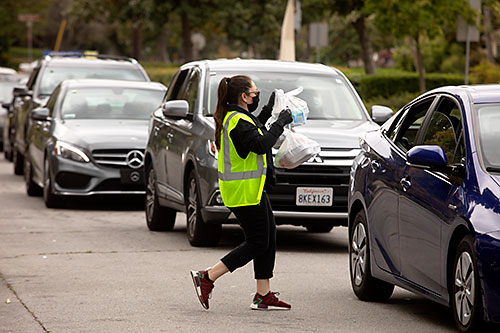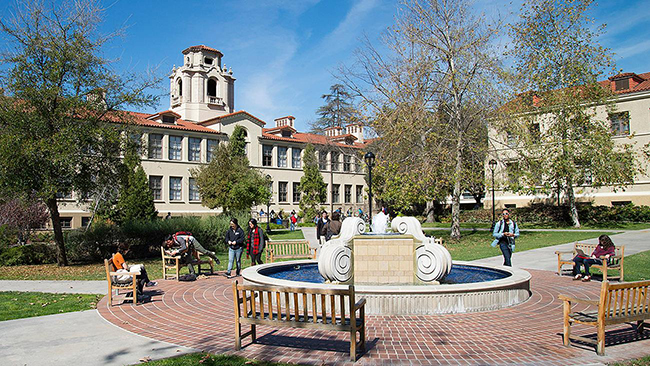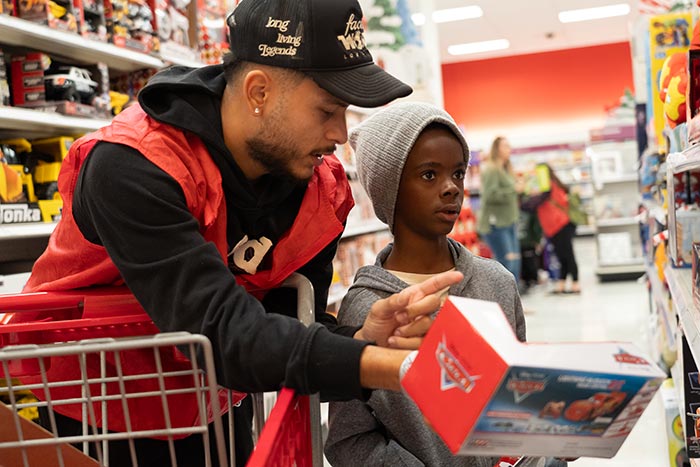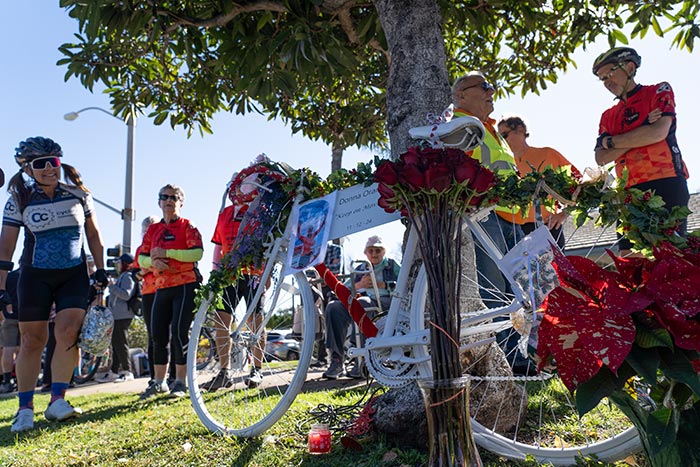Nonprofits deliver the goods to seniors

by Mick Rhodes | mickrhodes@claremont-courier.com
Claremont’s nonprofits have stepped up during the coronavirus pandemic to expand their reach, despite the difficulties brought on by short staffs and stringent new guidelines for dealing with food and the public.
Among the hardest hit have been the elderly and low-income populations, and Claremont Meals on Wheels and AgingNext are both busier than ever making sure they are doing all they can to help.
Throughout the crisis AgingNext volunteers have been delivering meals and groceries, providing rides to medical appointments, picking up prescriptions, and sourcing and delivering specialty grocery items.
AgingNext also took up the slack for Claremont’s now closed Joslyn and Blaisdell senior centers, which had both for years been providing scores of daily low-cost lunches to local seniors.
After the coronavirus lockdown hit, it began delivering frozen meals to these and other needy seniors. It now delivers about 175 to 200 frozen meals per day to clients in Claremont, La Verne, San Dimas, Pomona and Upland.
“And our list for delivery just keeps getting bigger and bigger,” said AgingNext CEO Floy Biggs.
And so does its list of volunteers.
“It’s been really nice,” Ms. Biggs said. “We’ve just had all these people calling in and saying, ‘How can I help?’”
Ron Wolff, 74, is a retired former president and CEO of Montclair-based nonprofit Oparc. He now heads up Claremont Meals on Wheels, which is an all-volunteer organization, including its president.
The nonprofit normally has about 135 volunteers on staff, and has welcomed about 10 new drivers and food packers over the past month. Many volunteers only work twice a month, and since MOW delivers 21 or 22 days a month, “it takes a lot of people to fill up all those slots,” Mr. Wolff said.
Every weekday Claremont Meals on Wheels sends out individual, freshly prepared nutritionally balanced meals. The hot portion of each contains a protein, a vegetable and a starch. The cold portion consists of a dessert, bread and butter, salad and milk.
For decades it has delivered meals to locals in need, and has seen its daily client list jump from 65 to 75 since the pandemic hit.
“We got a tremendous number of calls,” said Meals on Wheels president Ron Wolff. “Right now we have a waiting list and we’ve not experienced that within the last three years to my knowledge.”
The nonprofits’ deliveries are essential for many of their clients. Now that physical and social distancing is required, they are even more vital.
“Most of the individuals are very dependent on our service, and if we did not deliver, there’s a chance that they would not eat that particular day,” Mr. Wolff said. “Now they realize with times as tough as they are, our service is at risk. If something else were to go wrong—let’s say the virus were to get worse rather than better—it could impact our ability to function. But we don’t think it’s going to happen.”
One of the negative byproducts of quarantining has been the total isolation that some have been experiencing. Ms. Biggs said her agency is acutely aware of the danger this can pose for older folks.
“Many of the clients that we help are used to social isolation; it’s how they live,” Ms. Biggs said. “So we’re making more of an effort to be sure that we’re reaching out to all of those people to make sure that they’re doing okay.”
More than 75 percent of AgingNext clients are low income individuals, many living alone, on a fixed income, and without family close by.
“So in turn they’re calling us,” Ms. Biggs said. “We’re spending a moment talking to them, and asking how they’re doing. Of course we’re getting the information of what kind of meal they want, but also kind of getting a little more info about them, letting them know who we are, that we’re here to help and we’ll be here when this is over, and sharing what we do here because you’re aging at home.”
During normal times AgingNext also helps seniors connect with peers and make new friends. It hosts dinners, breakfasts and movie nights, get fit classes and various support groups. With gatherings restricted for the time being, it’s moved these outreach opportunities online.
AgingNext was forced to close its Memory Care Center for those with mild to moderate dementia that had previously met in Larkin Park. It’s now offering online and phone support to families caring for their loved one with dementia at home.
“So we’re doing virtual support groups in partnership with the Alzheimer’s Association when we can,” Ms. Biggs said. “We have people who come out of their houses and go in their cars to be able to talk to us about some of things that are happening at home. You know, how do you deal with certain situations, anxiety with their loved one in the home, and how you cope with [suddenly] being a 24-hour caregiver.”
Both Mr. Wolff and Ms. Biggs said the pandemic is not without its bright spots.
“This kind of a crisis brings out the best in a lot of people,” Mr. Wolff said. “We’ve had people donate within the last month or so and specify that they want their donations to be used to make sure that we don’t drop anybody for financial reasons.”
One of the positives from Ms. Biggs’ perspective was people are realizing how important social interaction and human contact is.
“It’s just so interesting,” she said. “Maybe that’s a good thing that’s going to come out of all this. I think things are not going to back to quote-unquote, the way they were. I think it’s going to be a different way of looking at things.”
If you or someone you know needs help from these nonprofits, call AgingNext at (909) 621-9900, email hello@agingnext.org, or visit www.agingnext.org,.
For Claremont Meals on Wheels, call (909) 621-4018 or www.claremontmealsonwheels.org/contact-us.










0 Comments